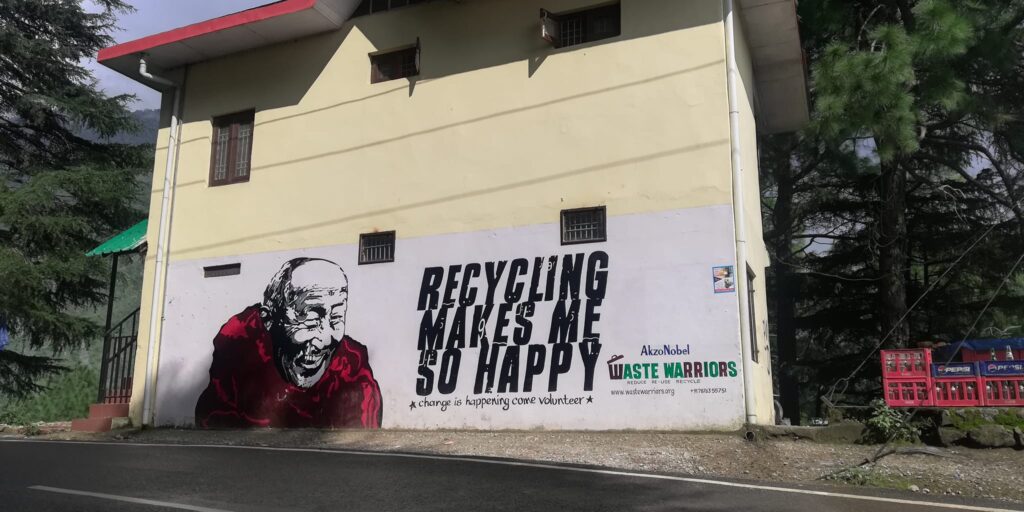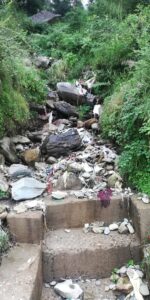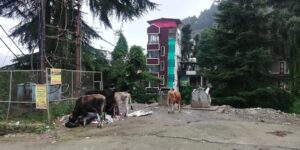Some Solid Steps To Manage & Recycle Waste In Our Hill Towns
Sep 16, 2022 | Shalini Rai
Graffiti related to waste management and recycling spotted near Dharamshala, Himachal Pradesh, on September 15, 2022 (Photographs: Shalini Rai)
I have been a regular, enthusiastic visitor to the mountain towns of our country. I began as a 9-year-old and am still at it, several decades later. Each time I stepped out of the main market area, Mall Road, central boulevard — call it what you like — in these picturesque towns, I was left shocked at the magnitude of the problem of waste disposal there.
Whether it was Manali and its wide alpine valleys, or Dharamshala with its misty environs and constantly-changing weather, or the magnetism of the postcard-perfect location of Ooty down south, I was struck dumb (and rushing to cover my nose) at the sight of rotting piles of garbage, plastic waste strewn on roadsides and mini-mountains of scrap.
Each of these places had an existing municipal body tasked with waste collection, segregation, disposal and recycling. Yet, you would be hard-pressed to believe that anyone, including the government machinery, was doing enough to manage and recycle waste. It is not such a mammoth task to collect and manage waste anywhere, even in these difficult-to-reach mountain towns.

Some of the steps that can be immediately taken towards this end by municipal bodies, residents and visitors to our hill towns are mentioned below.
Awareness campaign for hotel and restaurant owners:
Since tourism is the main occupation in most hill stations, the maximum amount of garbage is generated by tourist establishments. Any effort at checking the growing menace of waste can only be effective if hotels, guest houses, homestays, restaurants, cafes and eating joints – big and small – are involved in the effort.
Awareness campaign for households and domestic helps:
The cleanliness of a town has a direct impact on the health of its residents. It is therefore essential to ensure the involvement of residents — especially when they handle/manage waste personally. An awareness campaign for households and domestic helps would include meeting of one representative/household help of every household from each ward and every household being given plastic baskets to collect and carry (to the nearest garbage dump) waste/refuse.
Re-orientation of municipal staff:
As the municipal staff has a crucial role in keeping a town clean, they have to be apprised of the challenge and urgency of waste management and recycling. To this end, a 2-day workshop can be conducted by senior government officers of the Department of Environment & Forests and Head of Municipal Committee. The municipal staff should be apprised of the immediate action required to manage garbage. The workshop could elaborate on Dos and Don’ts for the municipal staff.
Town-cleaning Operation
A town-cleaning operation must be conducted to rid the town of litter, garbage and waste. Rivers, streams and waterfalls would be at the centre of this clean-up drive. This drive can be conducted with the help of NSS and NCC cadets, volunteers, the local Municipal Committee and the local administration.
In the long run, a Permanent Action Plan is the template which will guide waste management and recycling plans in these hill stations.
Preparation of a Permanent Action Plan
Clearing waste, preserving ecology and sustaining the environment-friendly momentum thus acquired is a continuing process. The progress achieved through spurts of short-term activity must be consolidated with lucid, comprehensive long-term goals and their execution.
A Permanent Action Plan tailored to the needs of any given town can be prepared with the help of the Environment and Forests Department, Urban Administration Department and the local municipal council. The following could be the core areas of focus of the Permanent Action Plan:
- Assigning a spot for final disposal of waste — The concerned Municipal Council will have to earmark a suitable spot for the final recycling, treatment and disposal of collected waste. This spot must be away from any habitation and water body, so that it does not generate further air/water/surface pollution.
- Determining the method of waste disposal — Incineration or recycling — the method best suited to dispose of waste will have to be worked out in consultation with the State Pollution Control Board, the Environment and Forests Department and any other stakeholder department/agency.
- Regular clean-up of rivers and streams – The Municipal Council and Gram Panchayats must undertake an intensive cleaning drive to keep the area’s water bodies clean. This drive can be organised twice a year — in March/April and October/November – coinciding with the start and end — respectively — of peak tourist season.
- Protecting rivers, streams and waterfalls — Rivers are usually the repositories of filth and garbage. A tourist town’s sewage and almost every other kind of waste makes its way into them. Novel, sustainable methods of keeping water bodies free from pollutants should be devised by a competent body – State Pollution Control Board, Forests/Irrigation/Public Health/Engineering or Water Supply Department and diligently implemented.
- Identification and training of volunteers for “Keep ABCD Town Garbage Free” campaign — About 100 committed volunteers – from among local residents, including students, shopkeepers, retired government employees, housewives, hotel representatives, anyone else – should be identified. These volunteers should be motivated to work to keep their hometown clean. After suitable short-term training, these volunteers can be “recognised” by the concerned municipal body. They can report cases of pollution and non-collection of garbage, among other such matters of non-compliance. They can be given special ID badges, jackets and caps.

The crucial bit is to factor in the unique challenges facing hill towns and then design a waste management/recycling protocol suited to them. Imposing plans that may have worked in the plains or forcing adoption of one-size-fits-all waste management programmes might lead to a worsening of the status quo and prove to be counter-productive.
